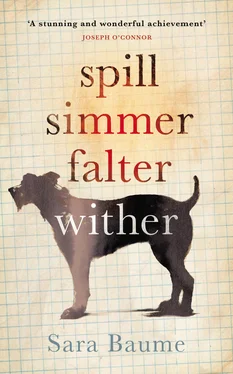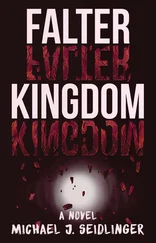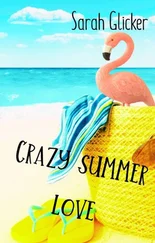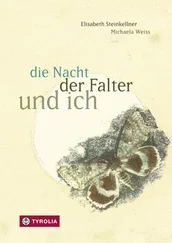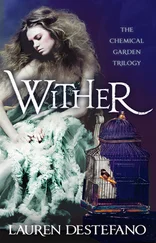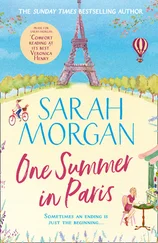In the village, a damaged row boat appears. Somebody’s hauled it into position between the signpost and information board at the mouth of the bird walk, leaned it sidewise on its keel. From our sitting spot inside the window we see members of the resident’s committee in high-visibility vests, painting its planks pistachio, shovelling compost between its thwarts and planting the surface solid with primula polyanthus. My father used to own a rowboat. It was much smaller and shabbier than the flowering one, and he kept it moored right there in the bay, roped to a rusted rung along the shore wall. It looked like a box made out of old doors, one of the burden boards even bore the screw holes of an absent handle. I have no memory of my father rowing his boat but he always went out to check on it in stormy weather. I used to think he didn’t care very much, now I wonder whether he cared too much, so much he could never bring himself to cast it loose and row.
Next door in the grocer’s the ice-cream machine is restored to service, and every morning the grocer or his girl wheel a display cage filled with plastic footballs and seaside paraphernalia onto the street front. There are small spades and flimsy fishing nets, rubber rings and buckets shaped like miniature castles. I’ve never really noticed the cage before, but now, this year, I think I’d like a football. What do you think?
Some are printed with cartoon characters and popstars, but I choose the one that is patched yellow, blue and grey as though it was tailor-made for you, for your incomplete colour spectrum. I carry it with us in a plastic bag, through the trees and past the oil refinery, over the brow of the barley field and down the hill to the beach. At first, you don’t take any notice. When I free you from the leash you set about your business of gallop and scavenge and splash as usual.
I kick the football into the air. It’s light but bounceless, and lands with a dull bump and the skew of the sand rolls it into the water. Paw-deep in drift junk, chewing the leg off a putrefied crab, you ignore it. So I chase after the football, kick it out of the small waves and keep kicking the length and breadth of the strand. Now I shout back at you as I go, stupid slogans of encouragement.
‘COME ON! CHASE!’ I shout, ‘GETTIT! GOOD BOY!’
What must you think of me? A giant hurtling about an empty beach with my clodhoppery hands clapping, my black plait beating against my hunch as I run. Now I’ve disturbed the sludge in my lungs and it swooshes and swirls and makes me wheeze, pant, wheeze, pant, wheeze. So I stop but when I turn back to check the junk, you’re hurtling after me. You’ve conquered your maggot nose, forsaken the pursuit of rotten apples and fermenting crustaceans. Tongue flapping free, you’re running, running, running. Snatching up the football, puncturing it with your fangs. Now semi-deflated, it fits snug between your jaws and you can clamp on, firm, and shake.
There’s no need for me to chant encouragement. You’re nosing it along the sand at a sprint and grunting with joy. Now you’re hunting it down as if it were a living thing, a hostile thing, an assailant. Now you’re killing, killing, killing.

I dream a dream of being born. I slop down onto a bed of newspapers. It’s cold and dirty and the headlines are blotted by amniotic fluid. Beyond the end of my nose, I see the pink tips of my mother’s teats, and all around I feel the clamour of my litter, the heat of tails and legs and bodies battling to suck.
Do you remember your mother? As a boy it took me years to realise I didn’t have one. At the beginning I believed children were allowed to have only one parent. That’s just the way it was. Only a rare few, only the children in storybooks and on television were lucky enough to have hit the double jackpot. I got a father, that was my lot. By the time I realised I’d misunderstood, it was too late to suddenly ask him what happened to the woman who gave birth to me. By then I’d accepted the chimney was my birth canal, the fire grate was my cradle, my mother was the house.
The first thing I see when I open my eyes in the morning, the view from the bedroom window at pillow level with the curtains open: the high wall behind the stone fence which conceals the grocer’s generators, can you see too? Can you see the mass of ivy-leaved toadflax flourishing there? The flowers have violet petals with bright yellow lips, but they are lost amid the plethora of five-pronged leaves and spaghetti stems. Every night it grows and climbs with ravenous force. Every morning it fills a little more of our window. One day, will we open our eyes to nothing but toadflax? Still we’ll claw our way through, I promise.

On the beach, I stop hurtling and walk even with the tide line and watch you with your ball. After a while you clamp and carry it. You veer away from the sea and head up the strand toward the cliffs and fields. I call you, and you come back. You carry your football in pace with me along the sand. But after several yards, you begin to veer off again. Now I see how you are drawn from Tawny Bay and back toward the hillslope, irresistibly.
What are you thinking? It’s hard to judge thought by the life in a tail, by the glint of light in a lonely peephole. And I wonder if it’s the badgers.
Is it the badgers, One Eye?
Can you hear them calling you?
There is singing, singing, singing.
It is sweet and undulating, like a finger licked and drawn around the rim of a wine glass, like a whole chorus of glasses similarly molested. It’s rising from the street, fluting through the cracks of our ill-fitted window pane, diffusing about the living room. I remember the song. I learned it from mass as a boy, years and years and years ago. I shut my book, lean forward in the potbellied armchair and try to dredge the words from the stew of my memory and hook them together again, so I can sing along. What do I sound like? Like a toad trying to squeeze inside a song thrush? Out of tune, out of time.
You’re at your sentry. Back paws on the cushion of the low chair, front paws balanced on a book heap in the windowsill, eye to the sea. The wet of your nose smears against the glass in the spot where you’re pointing, and all around this spot, there are old spots with old nose smears, dried and crusted and yet still glimmering. Like the aimless trails of a night slug, like a whole posse of carousing night slugs. You’re watching the gaggle of singing children on the street, little girls in white dresses with white veils clipped into their hair. You’re tilting your head to the left, pulling your curious face. The little girl’s veils are almost translucent and they skitter in the wind like tiny ghosts. Some are carrying baskets filled with flower petals and the two at the front are holding a plastic arch between them and the arch is decked with artificial roses. Now come the mothers. They’re gaggling a few yards behind the girls, keeping guard. They’re muttering to each other beneath the singing, praising somebody else’s daughter so somebody else will praise theirs back. I peek around the curtain, careful not to lean too far into the window. I don’t want to be spotted by the gaggles. I’m just as afraid of mothers as I am of children, possibly even more so. Dominus tecum, they are singing. Benedict tattoo.
It’s the May Procession, the first Sunday in summer. I haven’t been to mass in almost one year and one half of a year now, I’d forgotten that. Not since the occasion upon which I stood up in the middle of the homily and pronounced the word HORNET. I pronounced it with less force than a shout but precisely enough force to be heard from the pulpit. And because the church was three quarters full and I was in a pew around the middle, I presume most of the other congregants heard it too, from the woman in the wheelchair at the front to the man who always stood beside the water font holding the collection plate.
Читать дальше
